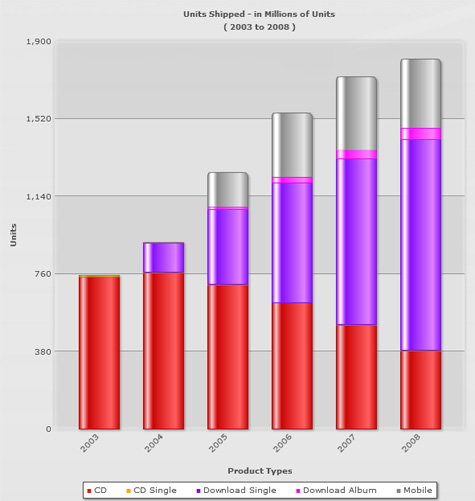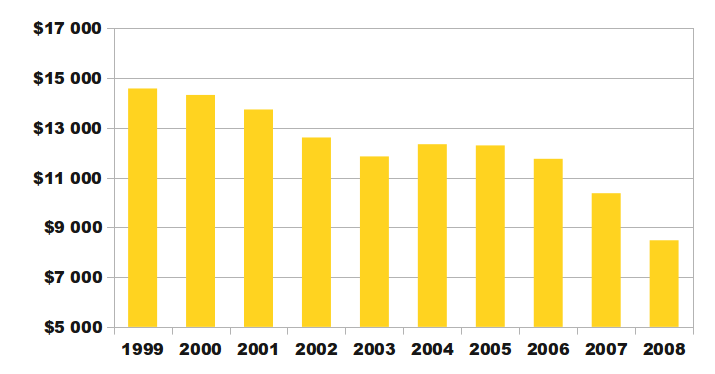I had to write a report of roughly four-five pages for one of my english classes, and this is what i ended up with. The topic is as the title says, online music piracy and its supposed and real effects on the industry. I know it’s not such a great writing, but derp.
The effects of piracy on the music industry
Music piracy has been subject to significant debate ever since the advent of the Digital Age, the spread of the internet. The RIAA, the Recording Industry Association of America of questionable repute has been proposing the harshest possible retaliation against illegal music copying and distribution, which resulted in numerous well-publicised crackdowns on sharing networks and websites such as Napster, Kazaa or more recently LimeWire. For over a decade the giants of the music industry have claimed that the rise of digital piracy is the reason for any and all economic problems the industry might face, including of course a decrease in sales. However, a significant number of internet think-tanks and researchers question these claims on various grounds. In this report I will analyse the claims of the music industry and the public response to these claims. As this issue only surfaced in the recent years, there are hardly any published research papers published on the topic, so the resources I use are all from the internet.
First, I will look at the claims of the music industry.

As Figure 1, a graph published by the RIAA shows, although the CD sales have indeed decreased by a significant 42 percent, single track sales on the other hand have seen an extreme, over 600% increase. The music industry claims that the decrease in CD sales is the result of illegal copying, e.g. piracy, however this claim is questionable once one considers that digital sales have increased significantly, even though piracy, as a chiefly online phenomenon, should have effected those the most. The researchers opposing this claim say that the decrease in CD sales is due to the so-called digital shift, a change in the carrier medium of music not unlike the shift from LP to cassette in the seventies and the later shift from cassette to CD. There is a generation of youth, say the researchers, who have never owned a portable CD player, only digital media players, such as iPods or Walkmans. Also, buying songs digitally from an online music store, of which there are many hundreds operating all around the globe, is significantly easier than walking to the nearest record store and buying a physical copy of the desired music on CD. Because of these reasons, youth nowadays hardly buy any music on CD. It is true, however, that recorded music industry revenues in general have decreased in the past decade from over 14 billion USA dollars a year in 2000 to “mere” 8 billion USA dollars a year in 2008 (see Fig. 2).

The music industry claims that this significant decrease is the result of the spreading of online piracy only, but researchers say that there might be other factors as well. Mostly the aforementioned digital shift: as the CD is becoming less and less popular, so goes down the popularity of music albums as well. This does not indicate that there are less music lovers or that they would like their music less—it can be explained by that while a decade ago one would have had to buy the whole album, even if he liked only a few songs from the release, from an online store he can buy only those songs he likes, which of course results in a decrease in album sales. And as a few tracks from the album cost less than buying the whole album, the income decreases as well. In spite of this, according to the annual report of the International Federation of the Phonographic Industry, there has been a significant growth in the music industry. Also, according to reports of the British BPI, in 2010 there has been an increase in music single sales on the grade of a hundred million units. Even digital album sales have increased by 30%, although album sales including physical media sales have decreased by 7%.
So far I have explored factors that could result in the decrease in the revenues of the music industry, but it is undeniable that music piracy exists, it is an illegal activity in every country that has copyright laws in its legislation, and as such poses a problem. It is debatable though, how big of a problem exactly. The IFPI famously claimed that 95% of all digital music worldwide has been pirated. As their datasets are solely proprietary, I can not confirm or deny this claim. The costs of piracy are undeniable, mostly thanks to the accounting standards of the music industry. Some labels claim their losses are hundreds of millions of dollars, and because of that pursue government action. They demand strict laws against online piracy, such as three-strikes laws. True, a three-strikes law is still a cheaper solution than the millions of individual lawsuits that the RIAA has filed, and which by the own report of RIAA cost more than the losses resulting from piracy. Gradual response systems and other such jurisdictional changes can bring results, that much is certain, seeing how such laws have been passed in advanced economies such as the UK, France or South Korea. On the other hand, researches question whether even a 30% decrease in piracy would have any significant effect on the actual music sales. The reasoning behind this is that by the means of piracy a demand without purchasing power is met, that does not hurt the recording industry while increasing economic welfare.
This is supported by the statistics concerning the changes on the piracy landscape after the shutdown of the immensely popular file-sharing service LimeWire in the last quarter of 2010. LimeWire had millions of users and allegedly accounted for over 30% of total online piracy. Going by the logic of the music industry, shutting down such a giant network of pirates must have resulted in a similarly significant increase in music sales. However, according to the data released by the RIAA, there has been a decrease of about 20% in physical sales in 2010 compared to 2009. According to a research by NPD, the number of music pirates in the US has decreased from 16% of the total population to 9%. This shows that although the number of pirates almost halved, there has been no significant growth in physical album sales, on the contrary.
On the other hand, the problem of making money out of this demand without purchasing power has already been solved by free services such as YouTube. Before the dawn of such services, listeners unwilling or unable to pay for the music they liked had no choice but to download the music illegally. YouTube, Vevo and other free streaming services however generate millions of dollars of profit to the labels that decide to publish songs for free there. The immense popularity of these services of course brought along a decrease in music piracy. The “pickier” group of listeners still favours the better quality of pirated downloads, but the more numerous group of casual listeners rather listen legally using these services—greatly aided by the spread of mobile broadband and smartphones. Universal Music alone has tripled the number views (and with that, incomes) on their videos published on YouTube.
Another possible reason for the problems of the music industry and of online music piracy is overpricing. A study published by researchers of the Duke University in 2009 polled hundreds of undergraduate students about whether they would buy a certain song for a certain amount of money or not. The data of the study shows that students are more willing to pay for a song that they know and that fits their musical tastes the most. Based on that data other researchers say that a more realistic pricing scheme would positively affect music sales. Some sarcastically add that every economy student learns first that an increase in demand results in the lowering of prices. I will not comment on that.
It is undeniable that the freedom of the internet and the difficulty in tracing users have contributed significantly to the spread of piracy. However, attacking the freedom of the net and tracing pirates by spending huge amounts of money on lawsuits and investigations is much less profitable than accepting that the internet and file-sharing networks are just tools that enabled music piracy, and not the reason behind it. The public opinion and researchers agree on that the music industry should meet the demand by putting more emphasis on digital media and counter piracy with free services, instead of cracking down on customers and trying to shape the demand to their ideal supply.
Many researchers also point out the positive effects of music piracy. According to the RIAA, only 15% of albums released is actually profitable. The music labels depend on that 15% to subsidize the long tail of lesser known, less popular artists. On the other hand, for lesser known artists the exposure gained by piracy is much more significant than the losses resulting from less album sales. This is analogous to the problem of free e-books: many writers say that obscurity is a greater problem than piracy. Piracy supports the long tail of lesser known artists, who can’t afford wider publicity marketing, by free, listener-driven exposure. It detracts from the most popular sales, thus making it more difficult for albums to be “hyped onto” charts. It also evens out the field of music industry not only for lesser artists, but for lesser labels as well. As these labels don’t have the financial background to afford marketing campaigns, they are more likely to release free sample songs, which then often bring about surprisingly great publicity to some artists.
Online piracy is not likely to be completely erased so long as there is any kind of freedom on the internet. It is not to be forgotten that the music industry has complained about bootlegging before the days of the broadband internet just as much as they are complaining about online piracy nowadays. If the music industry realises and utilises the immense possibilities of the digital market instead of clinging to the dying CD, researches agree on that the growth will exceed anything ever seen before. The internet can reach to every corner of the globe, even to places where it is impossible to find music stores. This spread multiplies the number of customers, the demand, and at the same time reduces publishing costs. The problem of unavailable music and obscurity of artists could disappear as a whole. Of course piracy can be and should be combated as much as any other infringement on the artists’ and publishers’ rights, but considering how easy it is to conceal oneself on the internet and how difficult it is for labels to pursue lawsuits and retaliate against pirates, such superficial treatments to the problem will bring close to no results. Treating the roots of the problem, which according to researches lie at overpricing, unmet demand and a shift in carrier media, piracy can be effectively decreased. This is clear when one looks at the decrease in piracy when the streaming service Spotify was launched in 2010 in Sweden, the country that is the home to one of the first Pirate Parties in the world and is the birthplace of the notorious BitTorrent tracker The Pirate Bay. Piracy is a problem, but it is not impossible to counter.
References:
